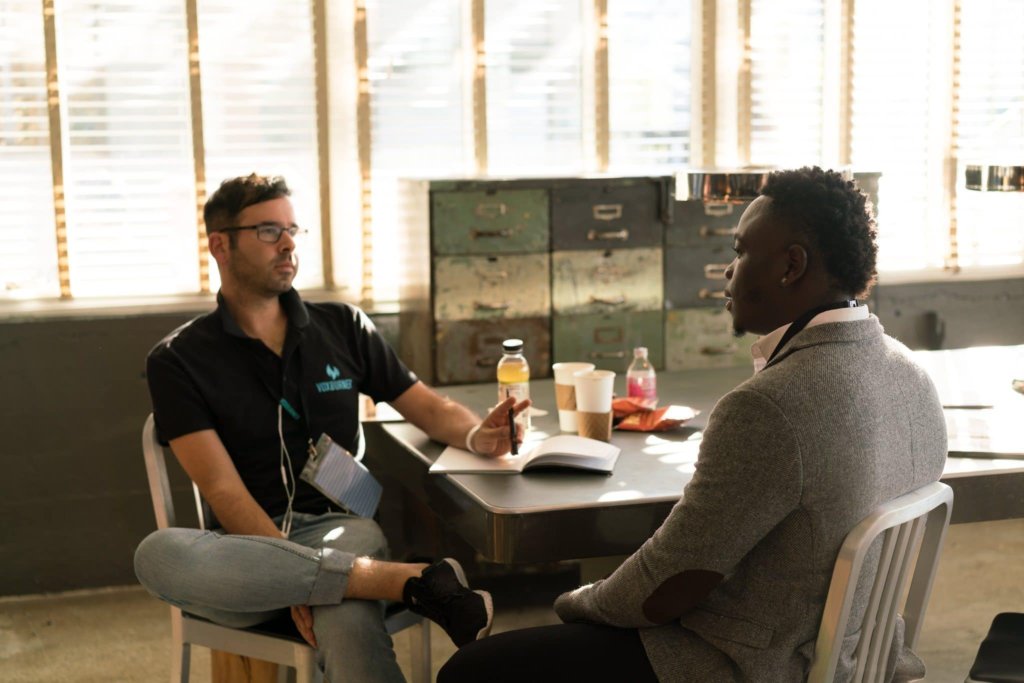Applying for a role in customer service or customer experience? Your potential employer will most likely want to ask you several specific questions about your experience to gauge your customer service skills.
Behavioral-based interview questions for customer service might sound intimidating at first, but they are not that difficult when you know what the interviewer is looking for and are an important part of the interview process.
What purpose do they serve, and what is the best way to answer them? Read on to see the top 15 common behavioral interview questions and answers customer service representatives get asked during their interviews.
What Are Common Behavioral Job Interview Questions?
Behavioral-based interview questions for customer service explore real situations that have happened to you during your work or based on your personal experience. They address common workplace situations where your personality determines the way you choose to act.

The Goals of General Behavioral Job Interview Questions
Customer service representative behavioral interview questions and answers are not meant to trip you up; what the interviewer is interested in is determining how you would deliver customer support on their behalf.
This will help them estimate how you can be expected to treat any similar situations that might arise after you are hired. In other words, whether your personal experience is in line with the company’s future needs.
You will be asked to describe the situation in detail, explain the way you solved it, and how it ended in a positive customer experience. This will illustrate a wide range of your skills — both professional and interpersonal.
However, not everyone is keeping a diary of their successes and analyzing every tricky situation they have been able to solve. People oftentimes get stumped by these questions even when their background includes very relevant experiences that could serve as validation of their customer service skills. Others are able to present even the least serious issues in a way that makes them look like the best possible candidate for the job.
What’s the secret to answering behavioral-based interview questions for customer service and getting ready for the interview? Let’s dig in.
Top 15 common Behavioral Interview Questions and Answers for Customer Service
Most of the time, the questions you are going to be asked will be predictable. They are supposed to showcase the most important skills and explore common situations. For your convenience, we have compiled a list of popular behavioral interview questions for a customer service representative to ensure that you are well prepared for your interview.

While there is not a single right answer to these, there is definitely a general direction your answer needs to take. Read these behavioral interview questions for customer service and answers to them, and try to identify which skills they are focusing on.
1. Describe a time when you had to deal with an angry customer. How were you able to resolve the issue in a way that made the customer feel valued?
Example answer: “A customer called complaining that she’d ordered food delivery four hours ago and still hadn’t received anything. I looked into the log files and discovered that her order had been accidentally canceled by one of my colleagues. I apologized, offered her a discount price for this order and the next, then processed her order again and marked it as the top priority.
“She had been understandably angry at first but ended up feeling satisfied. As far as I know, she’s still a great customer.”
2. Describe a time when you made a mistake and had to correct it.
Example answer: “I quoted the wrong prices to a customer, who then placed an order. Once I realized my mistake, I explained it to my supervisor. He not only told me to process this order at the price the customer was expecting (which was lower than the actual price) but also asked me to contact them to explain the confusion.
“All in all, everyone was very understanding, but I’ve made sure to double and triple check all the details ever since. It’s important to pay attention to the little things.”
3. What do you do when you don’t know the solution to the customer’s problem?
Example answer: “If I don’t immediately know the answer, I don’t pretend to have one. I simply tell the customer that we are going to look into the issue and either transfer them to a colleague who has knowledge in this specific matter, or ask for permission to call them back once I have researched the answer.”
4. Describe a time when a customer complained of a known issue with the company’s product.
Example answer: “There was a bug in our new software that we were aware of. When customers brought it up, I apologized and assured them I understood their frustration. I also made sure they knew that we were working on fixing it and always gave them an approximate estimate of the time it would take. Despite the bug, customer satisfaction was still high due to our proactive approach.”
5. Describe a time when you disagreed with a colleague.
Example answer: “I wasn’t sure the strategy suggested by a colleague would lead to the intended results, so I did a little research and suggested some improvements to his plan. We discussed them and were able to work out an improved solution.”
6. What does good customer service mean to you?
Example answer: “I see it as getting to the root of the problem and ensuring that it gets solved in the most efficient way. It’s also important to me that I deliver has a positive experience all the way, and stays with the company after.”
7. Describe a time when you were not sure what the customer wanted.
Example answer: “I used to work in tech support. The customers were often unfamiliar with the professional terminology we use, so it wasn’t always easy to figure out the request immediately through live chat. Whenever I wasn’t sure, I confirmed that I understood what they said, then asked additional questions for clarification.”
8. Describe a time when you took customer’s side and defended them.
Example answer: “A customer wanted a refund for our laptop she bought from an online store that we were partnering with. The store’s website listed the wrong tech parameters, and they didn’t want to accept a return because she’d already activated the OS. I contacted the store and pointed out that the description they provided was not true to the product.
“I was able to negotiate a refund for the customer, and we stopped cooperating with that store soon after.”
9. Describe the most difficult customer you’ve had to deal with.
Example answer: “I don’t believe there is ever a ‘bad customer.’ Sometimes customers are just stressed and can’t help taking it out on us. I had a customer who was very busy and often forgot the details of our conversations. That lead to frustration and confusion.
“I started ending our conversations with a summary of the points send to his email, and that helped to keep our dialogue smooth and productive.”
10. Describe how you communicated with other customer service representatives.
Example answer: “I’m a believer in the power of teamwork. At my last job place, we regularly discussed the tricky customer requests and best ways to treat them. Besides, we communicated with the product team by relaying customer feedback to them.”
11. Describe a time when you were under too much pressure and didn’t have enough resources.
Example answer: “It was a busy time before the holidays and I did not have enough time to respond to every client in a timely manner. One of my colleagues, however, had a lighter workload. We bartered: she helped me with client requests, and I volunteered to take her shift later when she needed an evening off.”
12. Describe a time when you had to adopt a customer from a colleague. How did you establish a relationship with them?
Example answer: “I realize how important it is to show the client that every representative of our company is just as professional as the one who worked with them before me. I made sure to study every note we had on this client’s history before contacting them. I always tried to establish rapport, asking about their day and generally addressing them in a friendly manner. I find it helps to start with forming a personal connection.”
13. How do you make sure you have all the relevant details on a new customer?
Example answer: “I use a spreadsheet where I save every relevant detail about a customer. I have a list of questions I always ask to make sure I have all the information I need to deliver a positive customer experience. This is my way to make sure we can always offer them personalized service.”
Hint: You can also use Nimble to access information on your contacts, including conversation histories and customer service interactions.
14. What do you like and dislike about working in customer service?
Example answer: “I like being able to help people solve their problems. I empathize with every person who feels like they’ve wasted money when the product or service does not quite work for their intended purpose. I always try to go the extra mile.”
15. Describe a situation when a customer changed the project requirements.
Example answer: “Sometimes, the customer gets a new idea halfway through the project, or even near the end. In this case, I address the issue in a supportive manner while still communicating my concerns. ‘This is a cool idea! The only thing I’m concerned about is that it might change the completion date of the project, and its budget.’”
Tips on How to Answer Behavioral-Based Interview Questions
You might have noticed a common theme in these customer service behavioral interview questions and answers examples. The customer is never unreasonable or stupid, and neither are your colleagues. Your honesty and empathy are being evaluated as well as your customer service skills.
It’s also important to present yourself as someone who is ready to own up to their mistakes and fix them. Your problem-solving skills allow you to take care of them in the most efficient manner. Showing that you aren’t afraid to ask for a little clarification from the client or advice from colleagues will play in your favor.
Finally, it’s always a good idea to research the company’s values before the interview. This way you can make sure you are really a good fit for the job and can present yourself in the way that will resonate with the interviewer and improve your customer service skills. Check out their social media profiles to get a feel for their brand promise.
Conclusion
The bottom line is that behavioral interview questions are nothing to be afraid of. They are not meant to trick you, and you will be able to get through the interview successfully if you know how to present yourself. Use our tips for behavioral customer service interview questions and answers to analyze your own customer service skills and offer a response that will help you show off your best qualities and skills.
This job is already halfway in your pocket!

